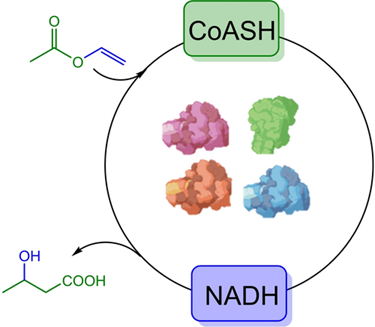In vitro biosynthetic pathways that condense and reduce molecules through coenzyme A (CoASH) activation demand energy and redox power in the form of ATP and NAD(P)H, respectively. These coenzymes must be orthogonally recycled by ancillary reactions that consume chemicals, electricity, or light, impacting the atom economy and/or the energy consumption of the biosystem. In this work, we have exploited vinyl esters as dual acyl and electron donor substrates to synthesize b-hydroxy acids through a non-decarboxylating Claisen condensation, reduction and hydrolysis stepwise cascade, including a NADH recycling step, catalyzed by a total of 4 enzymes. Herein, the chemical energy to activate the acyl group with CoASH and the redox power for the reduction are embedded into the vinyl esters. Upon optimization, this self-sustaining cascade reached a titer of (S)-3-hydroxy butyrate of 24 mM without requiring ATP and simultaneously recycling CoASH and NADH. This work illustrates the potential of in vitro biocatalysis to transform simple molecules into multi-functional ones.

